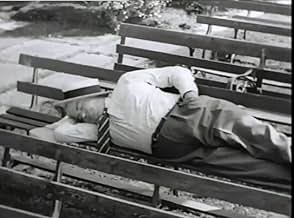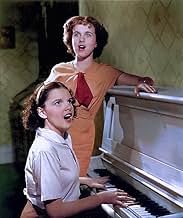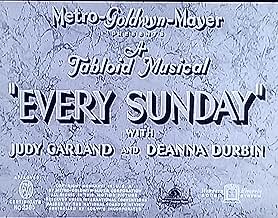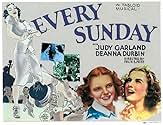Two teenage girls lend their fantastic singing voices to the cause when the city council threatens to replace the orchestra led by one girl's grandfather as the regular entertainment at the ... Read allTwo teenage girls lend their fantastic singing voices to the cause when the city council threatens to replace the orchestra led by one girl's grandfather as the regular entertainment at the Sunday concert-in-the-park series.Two teenage girls lend their fantastic singing voices to the cause when the city council threatens to replace the orchestra led by one girl's grandfather as the regular entertainment at the Sunday concert-in-the-park series.
Clem Bevans
- Man playing checkers
- (uncredited)
Jules Cowles
- Man in Audience
- (uncredited)
Paul Irving
- Mr. Bixby
- (uncredited)
Wright Kramer
- The Professor
- (uncredited)
Thomas Pogue
- Mr. Barfogle
- (uncredited)
Richard Powell
- Pop, Judy's Father
- (uncredited)
Kathryn Sheldon
- Woman Gotten out of Bath
- (uncredited)
Tammany Young
- Man Sleeping on Bench
- (uncredited)
- Director
- Writer
- All cast & crew
- Production, box office & more at IMDbPro
Featured reviews
Instead of making foolish comments praising one over the other (like comparing apples to oranges), fans of JUDY GARLAND and DEANNA DURBIN ought to just sit back and relax while watching this harmless little piece of musical fluff made simply to give audiences a look at two up-and-coming stars of the future.
Durbin's fans are insisting that she was the superior talent with the real singing voice and Garland fans are insisting that even then she was beautiful and sings up a storm on something called "Americana"--which, by the way, Garland does handle with finesse even though it's not even worthy of all her energies.
But both of them perform in a professional manner. Durbin's soprano voice is lovely and there's no reason for someone to complain that this type of voice "should not be coming from a child" of fourteen, instead of giving credit where it's due. It's obvious that she already had lots of vocal training and was already capable of handling operatic material and there's nothing wrong with that.
Judy too is in good voice, even though I personally think the studio could have chosen a more memorable song than "Americana" for her to belt out.
Anyway, together they blend nicely in a simple story about two girls who decide to do something when the local band concert is not attracting enough patrons to the park. They take matters into their own hands and come up with the idea of performing with the band as an added attraction. The stunt works and before you know it, they've attracted a good sized audience.
Audiences in '36 were probably pleased to see two such talented youngsters demonstrating their musical skills in a short film.
Durbin's fans are insisting that she was the superior talent with the real singing voice and Garland fans are insisting that even then she was beautiful and sings up a storm on something called "Americana"--which, by the way, Garland does handle with finesse even though it's not even worthy of all her energies.
But both of them perform in a professional manner. Durbin's soprano voice is lovely and there's no reason for someone to complain that this type of voice "should not be coming from a child" of fourteen, instead of giving credit where it's due. It's obvious that she already had lots of vocal training and was already capable of handling operatic material and there's nothing wrong with that.
Judy too is in good voice, even though I personally think the studio could have chosen a more memorable song than "Americana" for her to belt out.
Anyway, together they blend nicely in a simple story about two girls who decide to do something when the local band concert is not attracting enough patrons to the park. They take matters into their own hands and come up with the idea of performing with the band as an added attraction. The stunt works and before you know it, they've attracted a good sized audience.
Audiences in '36 were probably pleased to see two such talented youngsters demonstrating their musical skills in a short film.
In itself, this is a lightweight short feature with a predictable story, but it is well worth seeing as a pleasant part of cinema history. Seeing Deanna Durbin and Judy Garland together so early in their careers is a treat for anyone who has enjoyed their later pictures, and their energy and obvious talent more than make up for any lack of depth in the rest of the movie.
The plot is a simple one, with the two young women devoting themselves to saving a local concert series. What's interesting about it is seeing Durbin and Garland perform, since even at such a young age the difference in their styles is already pronounced. Deanna and Judy were both clearly ready for bigger opportunities.
This kind of feature probably doesn't hold an interest for a wide audience today, but for those who appreciate the classic musicals, it's worth seeing as a piece of movie history.
The plot is a simple one, with the two young women devoting themselves to saving a local concert series. What's interesting about it is seeing Durbin and Garland perform, since even at such a young age the difference in their styles is already pronounced. Deanna and Judy were both clearly ready for bigger opportunities.
This kind of feature probably doesn't hold an interest for a wide audience today, but for those who appreciate the classic musicals, it's worth seeing as a piece of movie history.
Every Sunday was basically made as a screen test for MGM execs to choose which prodigy they wanted to contract. Obviously, they chose Garland, and Durbin went on to great success for Universal in "Three Smart Girls".
I love this short film, and although it has no plot, it is interesting to observe the dueling divas sing their hearts out.
I love this short film, and although it has no plot, it is interesting to observe the dueling divas sing their hearts out.
We are very fortunate to have such historic pieces of film preserved. Deanna and Judy captured on film at the very beginning of their individual spectacular careers. Two diverse voices blended in a brief eleven minutes. Many other ledgendary performers were filmed at the outset of sound, and these may be the only records in existance of their performances. Living history.
8tavm
Having previously seen this short on VHS tape with the feature Summer Stock, I just rewatched Every Sunday on the TCM site. It marked the film debut of 15-year-old Deanna Durbin and of 14-year-old Judy Garland outside of her two older sisters. These two teens showcase their musical talents with a solo from Deanna of "Il Bacio", then one from Judy of "Waltz with a Swing" before the two climax with "Americana". The slight plot of this 11-minute film concerns the possible unemployment of Edna's (Durbin's real first name which is the way she's addressed here) grandfather's conducting job at the park because of low attendance. With the two girls' help, you can probably guess what happens from there! Contrasts are marked not only with Garland's and Durbin's musical choice but also with their height, poise, and movement. Despite all that, they perform quite well at the end and it's almost surprising that M-G-M chose Garland while Durbin was already contracted at Universal as this short was made but was briefly allowed back in since her feature debut (Three Smart Girls) was in the early preparing stages. Judy herself would make her first feature (Pigskin Parade) at 20th Century-Fox as M-G-M was deciding what movie she would next star in. That would be Broadway Melody of 1938 where she would perform the show stopping number, "Dear Mr. Gable (You Made Me Love You)". But back to this short, Every Sunday provides a warm and wonderful glimpse of two star singers at the beginning of their legendary careers unaware of what the future holds for them...
Did you know
- TriviaThis film was not (as is often reported) a "screen test" of sorts produced by MGM to help the studio decide which of these two girls, Deanna Durbin or Judy Garland, to keep under contract. Durbin was released by MGM and signed by Universal prior to this movie's production. A blurb on 1 June 1936 in "The Hollywood Reporter" stated "Universal had changed Canadian-born Edna Mae Durbin's name to 'Dianna' [sic]." This movie, it appears, was not produced until at least July 1936, by which time Durbin had already been signed by Universal and cast in her debut vehicle, Three Smart Girls (1936). The reason she appeared in this film was reportedly due to a provision in her MGM contract which entitled the studio to request her services for up to 60 days following its termination, provided she was not already shooting a film at her new studio. As filming on "Three Smart Girls" was not scheduled to begin until September 1936, Durbin found herself back at MGM making this short with Garland. This is why, although her on-screen character is called "Edna" in the short (Deanna's real name), in the credits she is billed under the name by which she would soon become internationally famous, "Deanna".
- GoofsWhen the girls are singing, their mouths do not always match the soundtrack.
- ConnectionsFeatured in That's Entertainment! (1974)
Details
- Release date
- Country of origin
- Language
- Also known as
- Каждое воскресенье
- Filming locations
- Production company
- See more company credits at IMDbPro
- Runtime
- 11m
- Color
- Aspect ratio
- 1.37 : 1
Contribute to this page
Suggest an edit or add missing content




























